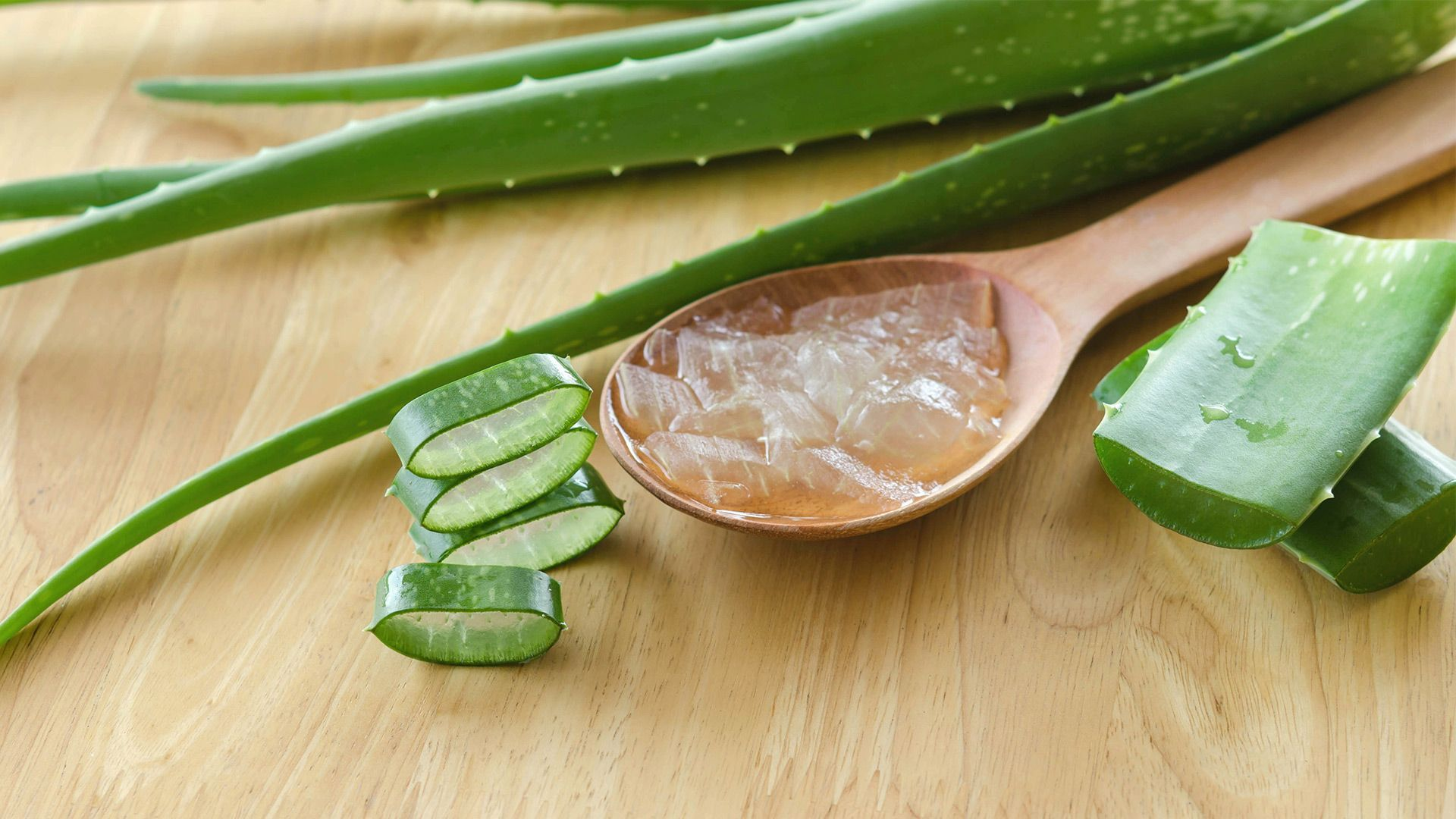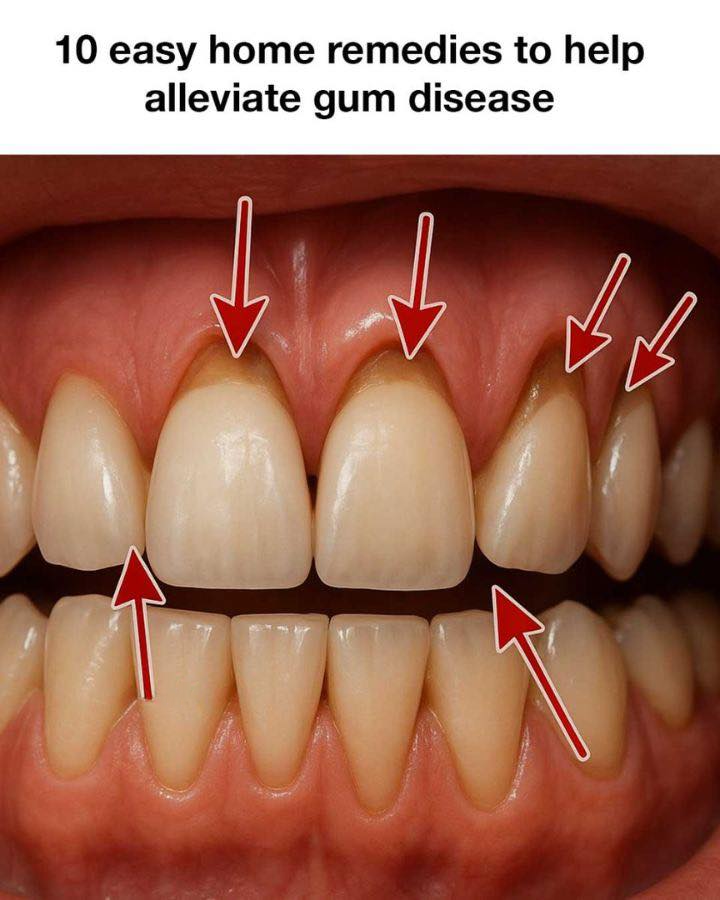Baking soda can help remove plaque, ease gum irritation, and create a healthier oral environment. Use it once or twice a week to support gum wellness.
5. Aloe Vera Gel: Gentle Relief for Irritated Gums
Known for its calming and healing properties, aloe vera gel can be applied directly to the gums to reduce irritation and promote healing.
Just apply a small amount of pure aloe gel to the affected area, let it sit for a few minutes, and rinse. Thanks to its anti-inflammatory and antibacterial effects, aloe vera offers a soothing option for gum care.

6. Tea Tree Oil: Natural Defense Against Bacteria
Tea tree oil boasts powerful antibacterial and anti-inflammatory benefits. Add a drop to your toothpaste or dilute with water to use as a mouthwash—making sure not to swallow.
Tea tree oil helps reduce bacterial growth, ease swelling, and encourage healing. Incorporating it into your oral hygiene routine can lead to healthier gums and a cleaner mouth.
7. Green Tea: Antioxidant Support for Gums
Green tea is rich in antioxidants, especially catechins, which have anti-inflammatory and antibacterial effects. Drinking green tea regularly can lower gum inflammation, fight harmful bacteria, and enhance gum health overall. Aim for two to three cups daily to enjoy its oral and general health benefits.
8. Cranberry Juice: Reducing Bacterial Stickiness
Cranberry juice helps prevent bacteria from clinging to teeth and gums. Drinking unsweetened cranberry juice can lower the chance of plaque and gum problems. Its polyphenols work against harmful bacteria, contributing to a healthier mouth. A small daily glass can be a delicious way to promote gum health.
9. Vitamin C: A Nutrient Essential for Gums
Vitamin C is vital for healthy gums and connective tissue. Low levels can lead to gum bleeding and swelling. Make sure you’re getting enough through your diet or supplements.
Foods like citrus fruits, strawberries, bell peppers, and broccoli are all rich sources. Adequate vitamin C intake supports the immune system and helps the body heal, making it essential for gum care.

10. Turmeric Paste: Natural Anti-Inflammatory Help
Turmeric contains curcumin, known for its strong anti-inflammatory and antimicrobial abilities. Make a paste by mixing turmeric powder with water or coconut oil. Apply it to the gums, leave it on briefly, then rinse.
Turmeric can calm inflammation, combat bacteria, and assist with healing. Using this paste regularly can improve gum health and ease gum disease symptoms.
Final Thoughts: Combining Approaches for the Best Results
While these home remedies can help relieve and prevent gum issues, they should complement—not replace—consistent oral hygiene and regular dental visits. Using multiple remedies can increase their overall effectiveness.
If symptoms persist, it’s important to seek professional dental advice. By incorporating these natural strategies into your daily habits and maintaining a balanced lifestyle, you can safeguard your gum health and keep gum disease at bay.
Baking soda can help remove plaque, ease gum irritation, and create a healthier oral environment. Use it once or twice a week to support gum wellness.
5. Aloe Vera Gel: Gentle Relief for Irritated Gums
Known for its calming and healing properties, aloe vera gel can be applied directly to the gums to reduce irritation and promote healing.
Just apply a small amount of pure aloe gel to the affected area, let it sit for a few minutes, and rinse. Thanks to its anti-inflammatory and antibacterial effects, aloe vera offers a soothing option for gum care.

6. Tea Tree Oil: Natural Defense Against Bacteria
Tea tree oil boasts powerful antibacterial and anti-inflammatory benefits. Add a drop to your toothpaste or dilute with water to use as a mouthwash—making sure not to swallow.
Tea tree oil helps reduce bacterial growth, ease swelling, and encourage healing. Incorporating it into your oral hygiene routine can lead to healthier gums and a cleaner mouth.
7. Green Tea: Antioxidant Support for Gums
Green tea is rich in antioxidants, especially catechins, which have anti-inflammatory and antibacterial effects. Drinking green tea regularly can lower gum inflammation, fight harmful bacteria, and enhance gum health overall. Aim for two to three cups daily to enjoy its oral and general health benefits.
8. Cranberry Juice: Reducing Bacterial Stickiness
Cranberry juice helps prevent bacteria from clinging to teeth and gums. Drinking unsweetened cranberry juice can lower the chance of plaque and gum problems. Its polyphenols work against harmful bacteria, contributing to a healthier mouth. A small daily glass can be a delicious way to promote gum health.
9. Vitamin C: A Nutrient Essential for Gums
Vitamin C is vital for healthy gums and connective tissue. Low levels can lead to gum bleeding and swelling. Make sure you’re getting enough through your diet or supplements.
Foods like citrus fruits, strawberries, bell peppers, and broccoli are all rich sources. Adequate vitamin C intake supports the immune system and helps the body heal, making it essential for gum care.

10. Turmeric Paste: Natural Anti-Inflammatory Help
Turmeric contains curcumin, known for its strong anti-inflammatory and antimicrobial abilities. Make a paste by mixing turmeric powder with water or coconut oil. Apply it to the gums, leave it on briefly, then rinse.
Turmeric can calm inflammation, combat bacteria, and assist with healing. Using this paste regularly can improve gum health and ease gum disease symptoms.
Final Thoughts: Combining Approaches for the Best Results
While these home remedies can help relieve and prevent gum issues, they should complement—not replace—consistent oral hygiene and regular dental visits. Using multiple remedies can increase their overall effectiveness.
If symptoms persist, it’s important to seek professional dental advice. By incorporating these natural strategies into your daily habits and maintaining a balanced lifestyle, you can safeguard your gum health and keep gum disease at bay.

